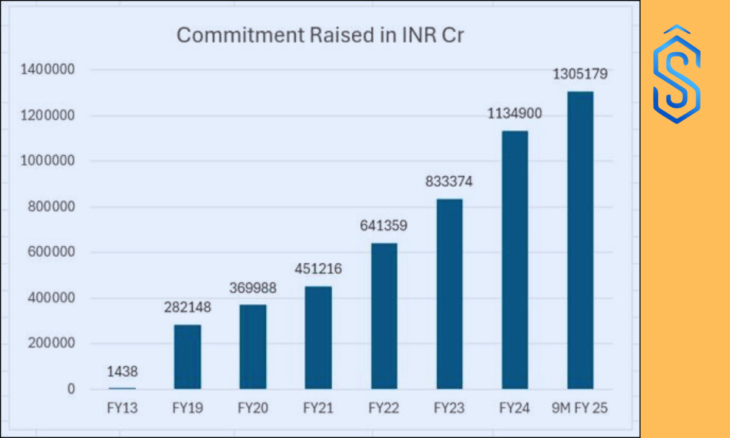Mumbai: Real estate continues to lead the way in Alternate Investment Fund (AIF) deployments in India, attracting ₹73903 crore in net investments as of the first nine months of FY2025, according to ANAROCK Research’s latest AIFs report. The sector accounts for the highest share—15 per cent—of the cumulative ₹5,06,196 crore invested by AIFs across various industries.
Anarock Report
The findings underscore the growing role of AIFs in addressing capital shortages in Indian real estate, especially as conventional funding channels face increasing regulatory and economic constraints. Other sectors that have drawn AIF investments include IT/ITeS (₹30,279 Cr), Financial Services (₹26,807 Cr), NBFCs, Banks, Pharma, FMCG, Retail, and Renewable Energy.
From FY2019 to 9M FY2025, the AIF sector has maintained a compound annual growth rate (CAGR) of approximately 26%. Overall AIF commitments during this period surged from ₹2.82 lakh crore to over ₹13.05 lakh crore.
Category II AIFs—featuring real estate funds, private equity, and debt instruments—have played a dominant role, contributing nearly 80% of total AIF activity in the past five fiscal years. These funds have attracted both domestic and foreign portfolio investors, with a near-even participation rate.
“The growing traction of AIFs, especially Category II funds, reflects their flexibility and strategic importance in addressing funding gaps across the real estate value chain,” said Prashant Thakur, Regional Director & Head – Research, ANAROCK Group. “Innovations like AI-driven risk assessment, blended finance models, and regulatory support are expected to further boost their impact.”
As part of this momentum, the government-sponsored SWAMIH Fund has provided liquidity support of over ₹35,000 crore, aiding in the completion of thousands of delayed housing units. However, its progress is hindered by issues such as regulatory bottlenecks, homebuyer litigations, and resistance from existing lenders.
“The SWAMIH Fund has been pivotal in restoring buyer trust and project viability,” noted Anuj Puri, Chairman – ANAROCK Group. “But to truly address India’s housing challenges, systemic reforms are needed beyond capital infusion.”
With 1,524 AIFs now registered with SEBI—up from just 42 in 2013—the sector’s transformation is both rapid and substantial. Its continued rise is expected to reshape India’s investment and real estate financing landscape over the coming years.











[…] Central Pune, which includes Haveli Taluka, Pune Municipal Corporation (PMC), and Pimpri Chinchwad Municipal Corporation (PCMC), contributed to 75% of all residential transactions in April 2025. However, its share fell slightly from 78% last year, as demand gradually expands to peripheral regions.ANAROCK Research: Real Estate Leads AIF Inflows with ₹73903 Crore […]
[…] Commenting on the Real Estate Sentiment Index report, Hari Babu, President of NAREDCO, added, “Despite minor dips in sentiment scores, the Indian real estate sector is showing resilience. Developers are embracing a more mindful, demand-led approach. Recent RBI repo rate cuts have also improved liquidity and boosted buyer confidence, further supporting the industry’s long-term growth.”ANAROCK Research: Real Estate Leads AIF Inflows with ₹73903 Crore […]
[…] Embassy Office Parks REIT (NSE: EMBASSY | BSE: 542602), (Embassy REIT) India’s first listed Real Estate Investment Trust and Asia’s largest office REIT by area, has announced the successful pricing of […]
[…] India’s key commercial hubs – Bengaluru, Hyderabad, Pune, and NCR – continue to attract businesses with their deep talent pools, infrastructure readiness, and strong demand across sectors. Flexible leasing models and build-to-suit solutions are also gaining traction, especially among tech companies and start-ups aiming for agility and cost efficiency.ANAROCK Research: Real Estate Leads AIF Inflows with ₹73903 Crore […]
[…] ₹168 per sq. ft. in 2025, a 28% increase from ₹131 in 2022, according to the latest report by ANAROCK […]
[…] This acquisition from a fund managed by Kotak Alternate Asset Managers Limited marks a key milestone in PRIME’s strategy to build a sustainable, high-quality, income-generating portfolio of office assets across India’s top urban commercial markets.ANAROCK Research: Real Estate Leads AIF Inflows with ₹73903 Crore […]
[…] According to data from ANAROCK, unsold luxury housing units (priced above ₹2.5 crore) rose by 36% year-on-year, from around 6,180 units in Q1 2024 to 8,420 units at the end of Q1 2025. This is the first annual increase in luxury inventory since 2022.ANAROCK Research: Real Estate Leads AIF Inflows with ₹73903 Crore […]
[…] satellite of Delhi, Sonipat is now fast becoming one of the most promising growth corridors in NCR real estate. Just 20 kilometres from the national capital, the city is undergoing a rapid transformation […]
[…] Even Chandigarh’s suburbs – Baddi, Barotiwala, and Derabassi – are evolving from industrial outposts to integrated living environments. Cities like Lucknow and Ayodhya are seeing renewed investment, driven by institutional frameworks, spiritual tourism, and government push.ANAROCK Research: Real Estate Leads AIF Inflows with ₹73903 Crore […]